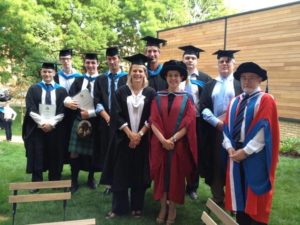POSTED ON
Degrees Apart

In our business the essential skill for a tanner lies in managing what happens inside the factory. It is not just making great leather but being able to make the great same leather day in and day out. The cost of errors – unhappy customers with empty factories, replacing raw material, jobbing off rejects – is just too high. Fitting those needs with the value of a University qualification is not always obvious and any University course that is intended to provide for industry needs requires constantly updating to ensure it is relevant.
Of course while our industry centres the conversion of hides and skins into leather there are many diverse elements in that process from the chemical industry through suppliers and users. Even within tanneries technicians may focus on production or research and on different parts of the process. For me a moment of truth arose when the Leathersellers proposed a grant to update the tannery, and the then Vice Chancellor, Ann Tate, agreed to match it. For a moment it looked as though the money was to be spent on “more of the same” just recreating a a basic tannery with “sort of” small scale equipment. But with a feeling all round that this would not be correct we were lucky to have in the team new staff such as Paul Evans and Karl Flowers who were able to restart the refurbishment from the point of view of the requirements of a teaching tannery rather than a mini production unit. Our friends in the chemical and machinery industries also helped with advice and in some instances free of subsidised equipment.
A walk through the tannery now is a transformation compared to just a few years ago. Ann Tate also demanded a full modernisation of the taught material to recognise that while the fundamentals might remain the technology as applied moves forward relentlessly. It was not enough, she correctly argued, to just teach the basics and expect graduates to bring themselves up to date when they start in employment. Hopefully now with our close industrial liaison and the courses run by partners in house and when we take students to Italy etc. we are keeping our teaching truly relevant and up to date.
The short course MSc fits an industry requirement
One of the most exciting recent developments has been the short course MSc., which is often called the three month MSc although that is misleading. While there clearly remains a demand for a full three year degree as a core offer the one year MSc always looked an important course as industrialist wanted to get their staff trained to an advance level in a shorter time. The format for this was then adjusted to better fit the needs if one industry partner – ECCO Leather – so that instead of this being a twelve month residential course the classroom and Northampton element was concentrated into three much more intensive months and the project/dissertation element is completed back at the student’s home factory. While distance learning is growing and improving with modern digital tools the value of on Campus discussions, demonstrations and practical work still cannot be under estimated. As a consequence this format of teaching the MSc is now undergoing an expansion and will be offered more widely. Tanners and others in the industry can afford to let staff away for a few weeks and those with industry experience do better with a more intensive. In creating this new fully accredited format to match high level leather education with industry needs Northampton has shown a willingness to adapt and develop to stay relevant to the modern world. New updated classrooms with lecture capture and all the tools of global inter-connectivity mean that leading edge teaching methods are available when required and with Fashion and Design, Podiatry, product design and the Business School all linked to the ICLT courses can continue to adapt and evolve to meet ever-changing industry needs.